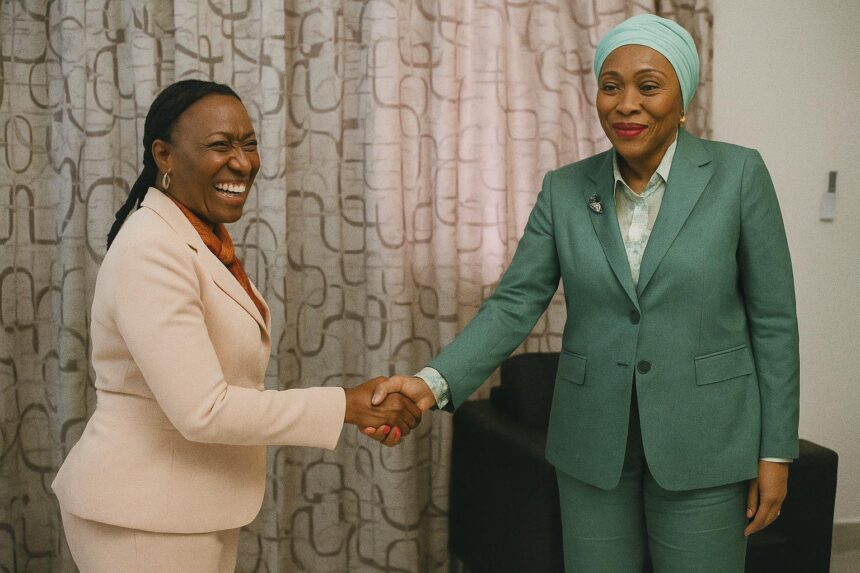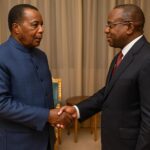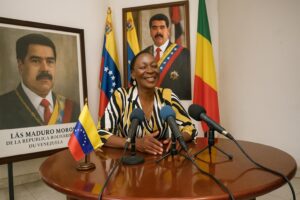A South-South Convergence Gains Momentum
Few bilateral dialogues illustrate the current reconfiguration of South-South diplomacy as vividly as the recent exchanges between Brazzaville and Caracas. On 16 July, Congolese Minister of Transport, Civil Aviation and Merchant Marine Ingrid Olga Ghislaine Ebouka-Babackas met Venezuelan Ambassador Laura Evangelia Suárez in the Congolese capital to take stock of the joint maritime and aviation roadmap agreed during the inaugural Congo-Venezuela Mixed Commission held in Caracas in October 2023 (Congolese Ministry of Transport communique, July 2024). While the encounter appeared routine, its subtext revealed an ambition to reposition both nations within an evolving global logistics architecture marked by congestion in traditional routes and a gradual tilt toward emerging Atlantic corridors.
From Caracas to Pointe-Noire: the 2023 Accords
The 2023 session in Caracas produced three memoranda of understanding covering merchant-fleet cooperation, airport management, and port services. Congolese negotiators sought Venezuelan experience in integrating state-owned fleets with private operators, drawing on the operational revamp of PDV Marina, while Venezuelan officials showed keen interest in Pointe-Noire’s deep-water terminal, a strategic Atlantic gateway for Central Africa. By reaffirming those texts in Brazzaville, both sides signalled that the documents would not remain legal ornaments but would frame deliverables ranging from crew-training exchanges to code-share agreements between Equatorial Congo Airlines and Venezuelan carrier Conviasa.
Maritime Synergies and Port Diplomacy
At the maritime level, the logic is twofold. First, Congo-Brazzaville’s merchant fleet remains modest—around fifty vessels under various flags—yet the country has set itself the goal of increasing cabotage traffic in the Gulf of Guinea under the 2025 National Development Plan. Venezuelan expertise in coastal shipping and liquefied natural gas tankers could accelerate that trajectory. Second, Venezuela views Pointe-Noire as a staging point to circumvent logistical hurdles in the Caribbean and tap niche African markets for refined products and agro-industrial goods. Port authorities in Pointe-Noire have already initiated feasibility studies on a dedicated Venezuelan logistics enclave within the container terminal, a project reportedly supported by the Central African Port Management Council (regional port communiqué, May 2024).
Aviation Ambitions in a Turbulent Market
Civil aviation cooperation is no less strategic. Both nations operate in regional skies dominated by larger carriers and constrained by persistent post-pandemic turbulence. Congo’s Maya-Maya hub handled roughly 800,000 passengers in 2023, a recovery yet to match its 2019 peak. Conviasa, meanwhile, has sought to recalibrate its international network after sanctions-induced disruptions. The envisaged Brazzaville–Caracas routing, with technical stops in Praia or Casablanca, would symbolically link two oil-producing Atlantic states while offering Congolese exporters an unbroken cold-chain for timber, fresh produce and, prospectively, vaccine cargoes produced under the African Medicines Agency framework. Training is equally central: Congolese cadet pilots are expected to join the Venezuelan National Experimental University of Civil Aviation under a scholarship scheme to be finalised before the end of the year.
Economic Diversification Beyond Hydrocarbons
Although hydrocarbons inevitably frame the bilateral narrative—Congo averages 268,000 barrels per day, Venezuela holds the world’s largest proven reserves—both capitals insist on diversifying trade flows. Ambassador Suárez underscored that point by presenting Minister Ebouka-Babackas with artisan chocolate manufactured from African-sourced cocoa processed in Aragua State as well as the honey branded “Miel de mujer,” produced by a women-run cooperative in the Andes region. The gesture dovetails with Congo’s national strategy to elevate the contribution of small and medium-sized enterprises to 40 percent of GDP by 2030 and Venezuela’s own push for non-oil exports that surpassed two billion US dollars in 2023 for the first time in a decade (Venezuelan Central Bank report, February 2024).
Cultural Diplomacy and Women-Led Trade
Soft-power symbolism often lubricates hard-power dealings. The exchange of artisanal products, particularly items created by women entrepreneurs, serves a dual function: it humanises state-to-state dialogue and protects the partnership from being caricatured as an oil-centric alignment. Congolese observers recall that the country’s accession to the African Continental Free Trade Area hinges on demonstrating inclusivity and value-addition, metrics where female-led businesses are closely monitored. Caracas, for its part, uses cultural diplomacy to mitigate the reputational costs of sanctions in Western fora. In this context, the honey jars and cocoa tablets handed over in Brazzaville amount to more than protocol—they are policy instruments aligning with both nations’ stated commitment to the United Nations Sustainable Development Goal 5 on gender equality.
Outlook for a Pragmatic Partnership
Meeting reports suggest a timetable extending over the next twelve months: legal harmonisation of maritime certificates by October, pilot port calls of Venezuelan vessels in Pointe-Noire before year-end, and a maiden non-stop demonstration flight between Caracas and Brazzaville in early 2025. Challenges remain—from insurance premiums on Atlantic shipping to the technical certification of aircraft components—but neither side appears deterred. Crucially, the partnership dovetails with Congo’s ambition to position itself as a multimodal hub bridging Central Africa and the wider Atlantic, a vision articulated by President Denis Sassou Nguesso in multiple investment fora. Venezuela, seeking fresh outlets for its manufacturing rebound, views the Congolese corridor as a gateway into the Economic Community of Central African States, whose combined market exceeds 200 million consumers. The convergence of these agendas, anchored in tangible sectoral projects rather than rhetoric, lends the initiative a measure of resilience often lacking in South-South frameworks. Insofar as pragmatism prevails, sea and sky may well become the newest theatres where Brazzaville and Caracas chart a diversified future.




















